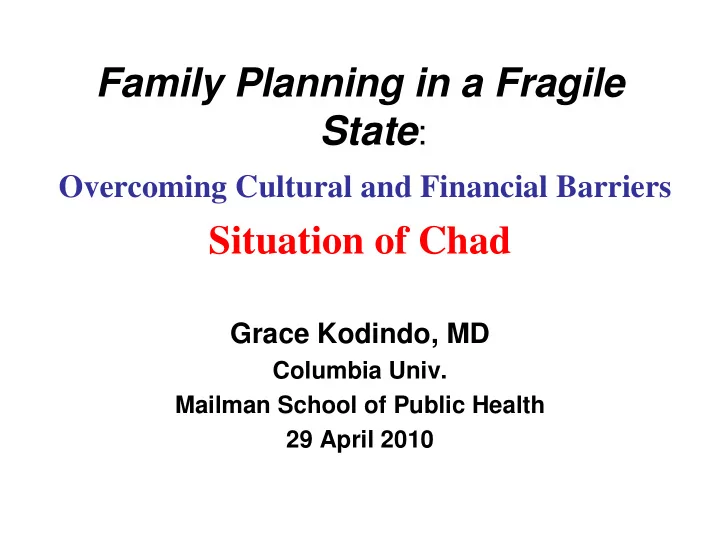

Family Planning in a Fragile State : Overcoming Cultural and Financial Barriers Situation of Chad Grace Kodindo, MD Columbia Univ. Mailman School of Public Health 29 April 2010
Chad: A fragile state • 1960: independence • 1960-1990: conflicts, civil war, political instability • 2003 - present - Darfur conflicts with 280,00 refugees from Darfur (2008) - 170,000 internally displaced persons(IDP) - 55.000 Central African Republic (CAR) refugees
Selected indicators for Chad • Population (2009): 10,329,208; 47% < 15 years • 74.8% in rural areas • Life expectancy 46 y (male)/ 47y (women • Total fertility rate: 6.3 ( DHS2, 2004) • Under-five mortality rate: 209/1000 • Female literacy: 20.8% • Maternal mortality: 1,099/100,00 live births (DHS2,2004 ) • Skilled birth attendants: 14% of births • Contraceptive prevalence for any method: 2.8% (2004)
Cultural barriers • Pronatalist culture: Family well-being instead of family planning thought to be linked to family limitation • FP=Birth spacing for married couple until 2002 RH law • Status of women is very low and she is valued by the number of children • High level of illiteracy, lack of access to accurate information and services; ignorance and misunderstandings about contraceptives side effects and consequences • Contraception still believed by some health providers to be only for married couples; husband’s permission.
Delay in FP programs in Chad - Delay of FP until late 80s (1920 French Law prohibiting sale and promotion of contraceptives) - 1920 French law removed and replaced by new RH law in 2002
Barriers to FP use in Chad Availability and Financial barrier: ● In public sector: Quality contraceptives are free in some public hospitals in few cities through heavy UNFPA assistance . In rural or remote and poor areas: lack of information or services of modern contraceptives and lack of transportation to services and trained staff. In few cities :IPPF affiliate Chadian Association of Family Well-being has clinics for adults and youth centers Private pharmacies: contraceptives are too expensive
What worked ● Advocacy: - New RH law: FP for each individual instead of only couples ● Demand increases where accurate information an quality service are available New strategies to move FP services and information to where people live: Since 2007, mobile RH strategy in two rural districts in the south with assistance of World Bank: Contraceptive use has increased from 0% to 99%
Challenges for Chad • Total dependence on one donor : UNFPA In 2003-2005: we had no contraceptives in public sector • Need for expansion of accurate FP information and services for marginalized people: rural, illiterates, poor, adolescents, refugees and displaced people • Need for more funding, diverse donors, government ownership and focused programs.
Conclusion: programs not based on misconception but on real needs • African do not want contraception • Women are afraid of long term contraception • Men are against contraception Benefits of Family Planning are well known every where: People only need accurate information, affordable, acceptable and quality services based on their needs
• Thank you for your attention
Recommend
More recommend